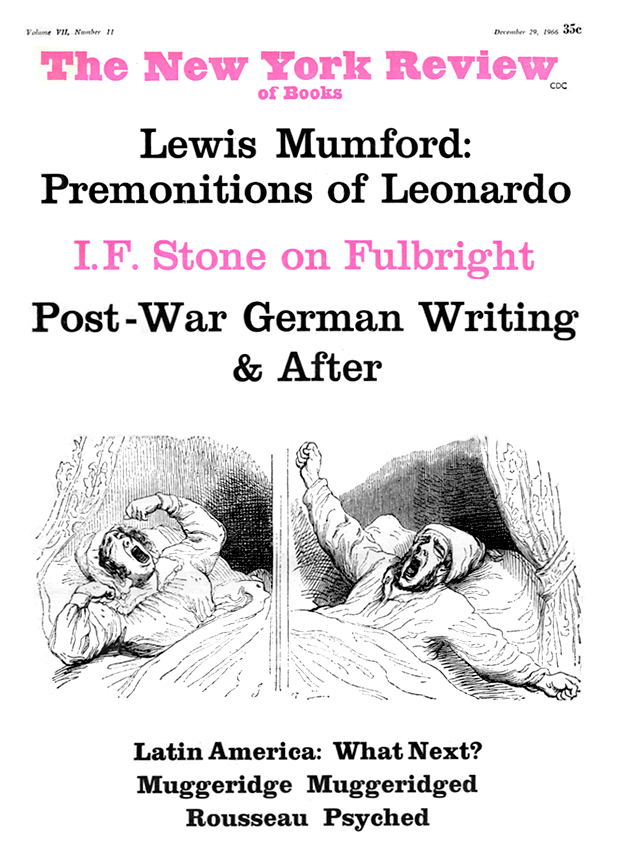In response to:
The Double Dealer from the September 8, 1966 issue
To the Editors:
I was fascinated by Mr. Gar Alperovitz’s review of Allen Dulles’s The Secret Surrender. I am not competent to judge whether or not Mr. Dulles’s somewhat meaningless negotiations helped spark off the Cold War, but I would like to bring to your attention a number of rather disturbing—indeed shocking—statements that Mr. Dulles makes about some of his German co-conspirators. Throughout the book he suggests that SS Standartenfuehrer Eugen Dollmann, Himmler’s representative in Rome, and SS Obergruppenfuehrer Karl Wolff, the High SS and Police Leader of Northern Italy, were somehow atypical Nazis—reasonable fellows, “good” Germans, at odds with such fanatics as Kaltenbrunner.
This is monstrously false. Mr. Dulles, for example, writes of Dollmann: “Of quite a different cut among the German SS in Italy was Colonel Eugen Dollmann.” He goes on to describe him as an art historian, a writer, a man who never attended the SS training schools and seldom wore the SS uniform. He neglects to make it clear that the art historian was the official representative in Rome of the RSHA, the overall Police and Gestapo agency of the SS, and that in 1943 he complained to a fellow German bureaucrat that the Italian armed forces were “still shot through with full Jews and countless half-Jews.”
The case of Karl Wolff is far worse. Dulles tells us that Wolff “was not concerned with the organization and administration of the SS itself” and that he was “not primarily either a commander of troops or a police official.” He goes on to suggest that Wolff was such a reasonable fellow that “he was naturally resented by the more typical Nazi and SS types.” This is either deliberate evasion or pure ignorance (which I find hard to accept in the former director of the CIA.) Wolff, as Himmler’s Chief of Personal Staff, was privy to every act of the SS. To give one example, it was Wolff who informed Himmler of the Kristallnacht, in November of 1938, and who sent the SS into action—an action in which 20,000 Jews were rounded up and sent to concentration camps.
The most monstrous and unforgivable evasion in Dulles’s book is on page 253, when he discusses the charges raised against Wolff after the war. Dulles says: “There was also one piece of documentary evidence. In 1942 Wolff had put his signature to a paper which requested additional freight cars…for use in Poland. It seemed that there was evidence that the cars were for transporting Jews….”
I think your readers might be interested to know the text of that document—one that paints Wolff in a rather different light from that of the reasonable fellow whose relations to Mr. Dulles were so cordial:
Dear Party Member Ganzenmueller:
For your letter of July 28th, 1942, I thank you—also in the name of the Reichsfuehrer SS—sincerely. With particular joy I noted your assurance that for two weeks now a train has been carrying, every day, 5000 members of the Chosen People to Treblinka, so that we are now in a position to carry through this “population movement.” I, for my part, have contacted the participating agencies to assure the implementation of the process without friction. I think you again for your efforts in this matter and, at the same time, I would be grateful if you would give to these things your continued personal attention. With best regards and Heil Hitler!
Your Devoted
W
I am indebted to Raul Hilberg’s monumental The Destruction of the European Jews for this letter, which makes me rather doubt Allen Dulles’s claim that Wolff frequently lent a helping hand to the persecuted in private. Maybe he did—Eichmann made the same claim, after all—but the fact remains that Mr. Dulles is deliberately white-washing an odious and repugnant satrap of the Third Reich—all the more odious because he was not a brute, like Hoess, nor a nonentity, like Eichmann, but an intelligent and educated man.
Are we really to believe that Mr. Dules remains ignorant to this day of the nature of his co-conspirators? Are we to assume that he is merely naive? Or must we conclude that a career which has been marked by a compulsive refusal to admit the truth, as in these pointless negotiations which brought about a surrender only a few days before the German collapse, against the order of his own government and at the risk of offending the Russians, has made Mr. Dulles believe that he can hide anything. Alas, in the case of Karl Wolff, as in the case of the U-2, the evidence is there for all to see. Not even Mr. Dulles’s coy evasions can hide the nasty truth about “the diplomat and political adviser” who took such an active and personal interest in the little matter of the Jews who were to be sent to Treblinka, to be gassed.
Michael V. Korda
New York City
This Issue
December 29, 1966


